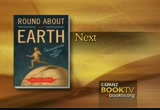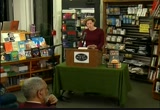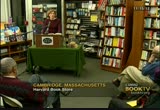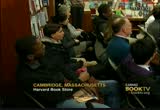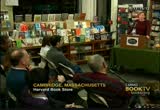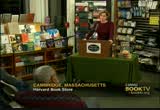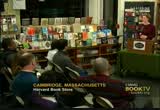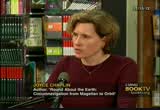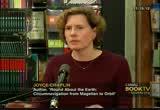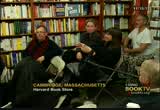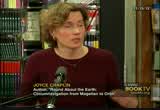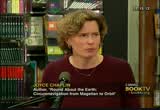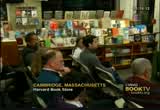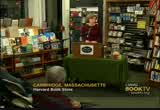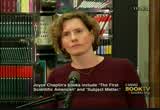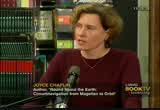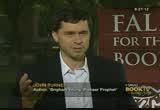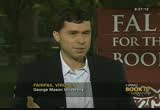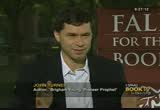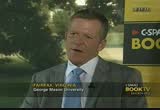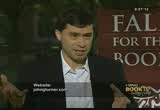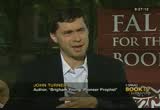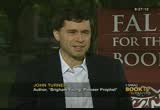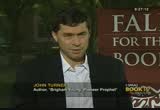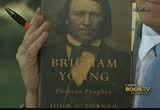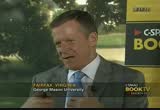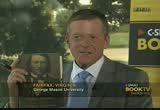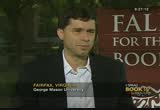tv Book TV CSPAN December 15, 2012 10:00am-11:00am EST
10:00 am
our facebook page. >> now booktv continues with joyce chaplin. she explores the history of the circumnavigation of the earth, going back to the days of portuguese explorer ferdinand magellan. this is about 45 minutes. .. six years ago in bermuda i embarked on 120-foot sailing ship, the sea education association's ship.
10:01 am
i would tnc for three weeks away from telephone, internet, and physical libraries, yet i was in the middle of a research project on benjamin franklin that required me to every material and french. decided to use my time at sea by reviving my french. i chose a small paperback edition of jules verne, around the world in 80 days first published in 1872. when i was busy and the ship by may ballot to the book. my french was good enough to my surprise that i enjoyed the story and as a historian i appreciated its detailed. especially the nature of the protagonist. his london club remarks offhandedly the scheduled travel services can take a person around the world and 80 days. prove it, and he's off. the ada measure was only conceivable by the late 19th
10:02 am
century. in the age of sailing getting around the world had taken months or even years. the speed of my ship would have lost fog is bad. it was the invention of steam power but also the creation of regimented european empires around the globe, the opening of the suez canal and the emergence of commercial travel services that together made it just possible by the 1870's to do the global circuit in 80 days. the second thing that impressed me about the story was of the material developments that sped up global travel required a dramatically increased use of natural resources. when he leaves london he takes his new valet. that two men aboard a night train which is scarcely departed london when he lets out a cry of despair. in the rush my state of confusion i forgot to switch out the gas lamp in my bedroom. well, you will be paying the bill. the gas plant is the running
10:03 am
joke. only the small part of the journeys total cost, but they quickly realized the joke is on us. we are notoriously the first generation that has realized with the plants are built for centuries a burning fossil fuel is going to be. in verne's eric cole was a costly but essential part of modern progress. but he's steam-powered exploits set up the height of european imperialism represents a phase of the past naturally is history coming over and done with. airplanes have replaced the cold-burning engines and ships that hurdle fog around the world the empire's a protected some people have been replaced with other political regimes. it is not difficult across the surface of the world in 80 days, though it is easy to fly around it in hours if you can afford a ticket and get a passport and visa. when i return from the sea back on land i look for history of
10:04 am
around the world travel. there was none. i wrote one. now, i very quickly decided early on in the project that there was no point in trying to document all of the navigation that ever actually existed. i did not want to write an encyclopedia. i wanted to explain why it is distinctive and we have the turn around the world. what does this mean? what is going around the world matter in the broader scheme of things? it matters because human beings had been thinking to themselves on a planetary scale for a long time for very nearly 500 years. this is significant. the planetary consciousness is recent, something developed in modern time, something that we have the people in the past didn't. we associate this realization of things on a planetary scale with our ongoing environmental crisis , which we think of as
10:05 am
unprecedented, which it is. the planetary consciousness that goes along with it may not be unprecedented. second navigators for a very long time were, by definition, not only thinking of themselves in relation to the entire planet but doing something in relation to it by going around it. circumnavigation is the oldest human activity down on a planetary scale and quite remarkably its 16th century sailors to get it first. in this book i designed around the world travel as a geode drama. within the european countries that sponsor the first circumnavigation there was an established tradition of considering the world as a theater. this is an ancient greek idea, sustained the roman antiquity and the renaissance and exemplified, perhaps most famously in shakespeare's claim
10:06 am
that all the world as a stage. a metaphor, but around the world travelers made it a reality by presenting themselves as actors on a stage of planetary dimensions. over time, circumnavigation would be represented as dramatic entertainment, first in print and then on stage and later in town. geode, is different from geography, many depictions of the earth made by writing. geography engages the human eye, hand, and mine dimaggio drummer requires all of a human being, the entire body and its range of physical experiences in relation to the earth. that whole body experience of the earth is well documented in accounts of circumnavigation which describe what it count -- felt like. but people never go around the world, but by now almost everyone has some idea of the statement that such a journey makes. for that reason published first-person accounts are this
10:07 am
book's principal sources. together they account constitute the longest and most sustained way in which people have been able to consider themselves as actors within a geodrama, even as it has changed over time. the changes can be understood as three acts in the trauma, three phases in human beings comprehension's of themselves as actors. in the first act which lasted from magellan's departure on the first circumnavigation to james cook death and how why from 1519 to 1779, mariners went around the world did so in fear. it was reasonable for them to be fearful given the dangers of such a voyage in the age of sail when mortality rates for circumnavigation routinely covered in the 80th and 70th percentiles. a lot of people who tried to your around the world. the world simply charge most of them off. in this initial phase the longest in history of circumnavigation comment that
10:08 am
prevailed. travelers did so with a striking confidence that they could survive the experience. western societies had generated technology and political networks that seemed to have conquered the globe. at this point it was not only possible to go around the world, but it had become a popular pastime. representations' of during circumnavigation became playful, enticing, even joyous. there were costs outweighed by the glories of making an easy swing around the planet. over the 20th century and now into the early 21st century the confidence has given way to doubt. technological in your forms of travel, especially airplanes and rocket-propelled space capsules provide the sense of extreme danger that has faded during the relatively safer 19th century. equally, it is now clear that imperialism had smoothed away
10:09 am
from most earlier circumnavigate years. on the political and social conditions that would be unwise and unjust to perpetuate, let alone recreate. above all, a growing sense that the planet is beginning to buy back or shrug us off now that the environmental cost a planetary domination has begun to haunt us. we live with of three legacies of around the world travel, reemerging fear that the planet could simply shrug us off, continuing confidence that we might be able to generate technologies and political alliances to dominate the planet , but doubt that it is always wise to dominated in that way. it is especially apparent that the characteristic confidence of the long 19th century was the shortest of planetary experiences yet has been the most difficult for us to relinquish. our current doubt seems to be taking a back to the fears of the early modern times, a circular return that matches the swings around the globe that themselves went through the three acts of ..
10:10 am
always more hopeful elements to the story. those bright moments matter, and they make clear that the human past is as complicated and contradictory as its present condition weather seen on a small scale or a large one, even the largest of all, a geodrama in three acts. i wish i could introduce you to all the characters in the book, all of the people, animals, and even the robots that have circled the world. but for a 500 year history, this would mean really going through literally a cast of thousands. i decided to read to you about just a handful of folks from the waning years of confidence about going around the world. when the prospect of aerial circumnavigation, which was first than in 1924, raised questions about whether going around the world was getting too easy and whether the older harder and perhaps much more dangerous waste represented something better and if so for
10:11 am
home. there would always be suspicion that flying around the world was cheating, surface travel was more challenging. in 1928 the danish newspaper politic and in partnership with the stockholm newspaper advertised that it would send a boy aged 15-17 around the world to commemorate the famous novel. the boy had to be in good health, needed permission from his family, must speak english and german in order to do interviews, and he was not allowed to fly. the canadian pacific railway a range of travel and the newspapers would pay any remaining expenses. the competition was open. over 100 boys mob the of the -- office in copenhagen. a group telephoned to protester in eligibility. good for her. the staff eliminated all but the 15 year-old boys.
10:12 am
an essay contest identified two finalists. both of them boy scouts. the two boys drew lots. the winner, a freckled face to read it went on to tell his mother that he had a week in which to pack ended his vaccinations. required to keep a diary in either male or telegraph report at each stop. another obligation was to meet and turn the public which made him into a roving commercial advertisement, particularly for canadian pacific railway. a book near reading journey appeared the following year. hard to tell how much of it is his own prose. his comment on meeting the press in london, reporters were awfully with the end we have a lot of fun together, hands that the newsroom pros back in copenhagen and give him a final shape. but for the 44 days he went round the world, he was the star of the show. the premise of the journey was
10:13 am
that a circumnavigation was the ultimate adventure, a good, but not dangerous test of character. that emphasis was reinforced by the reid introduction to the english translation which was written by graham stating around the world, everyone of us has made the voyage many times in our imaginations. the introduction made at this point typical not to magellan, the great pioneer of the whole thing. it threw in francis drake for good measure, but in its fast board to jules verne his posthumous of reputation was beginning his to send. his stories were challenging yet now in the 1920's his narrative claimed that his mother had red baron to him when he was a child and that the novel was the only book he took around the world, as if it were the cirque navigators bible. the boy's own element of the story was present above all in his in the international fraternity of boy scouts.
10:14 am
the 1928 market peaked in early enthusiasm. the other finalists for the competition or for the adventure where both boys' coats is probably not a coincidence. a scout is never without a home. he is sure of being received wherever he goes in the entire world. indeed, he was the guest of the scoutmaster of japan and many groups of scouts everywhere from tokyo to warsaw. other aspects of his journey emphasizes use. when he arrived back in copenhagen the two policemen had to hoist and through the crowd and carry him to the newspaper office. the juvenile from a climaxed during subsequent visits to england and france. in london he attended a gala luncheon with the head of the canadian pacific railway and even better he met sir robert powell, founder of the boy scouts. when he was in paris seesaw around the world in 80 days, a
10:15 am
very popular stage version of the novel that had been playing for decades. he watched a copy of the novel being printed expressly for him down in gold and embossed with his name on the cover. he then met jules verne's grandson who escorted him to grandfather's grave. they're surrounded by local boy scouts he later wreath with the message in memory of jules verne, from his greatest admirer . avoided aviation in order to make some kind of point about their place in the world. bicyclist who were not from the western imperial powers began to rebound and the bicycle as a peaceful way to see the world. certain cycle the world from 1901-1904, gathering admiring newspaper accounts as he did so, but because he did not publish his own narrative of the journey, he remained better
10:16 am
known within asia and beyond. later pleased to welcome to japan three fellow asian cyclist, a trio of young indian and he did a world tour on bicycles to show indias equality with other nations. the three young men were members of the bombay weightlifting club , so they were in very good shape. when they left, on bicycles and october 23rd returning in march 19285 years later having covered 44,000 miles and demonstrated that the sons of mother india were is able, enterprising, and courageous as the children of any other nation in the world. in making that point the three men revealed the kern is a global society that assisted them. the first was the british empire , not an obvious choice in some sense of paradoxical one, but the bicyclists were anxious to make clear that there british
10:17 am
passports and a letter of introduction from the british governor of bombay had been critical to their passage into and through your. whatever their private feelings, they saved their criticism of imperialism for french indochina where they planned to encounter racism unparalleled in any other part of the world. they routinely stated branches of the ymca, the equivalent for grown men of the boy scouts, and they were cheered on by enclaves of indians and especially parsees to constituted the south asian diaspore over most of the globe remarkably, a consequence of empire and a kind of counterweight to the. a different diaspore, and similar manifestations of internationalism supported this clutch of certain navigators'. this internationalism supported his slightly later surface toward the world. came from a privileged russian family, but that was of no help when he found itself on the
10:18 am
losing side in the russian civil war during that country's revolution. as of white russians stranded in china, a man without a country. so destitute that he made his way to shanghai in a mix of men and women's castoff clothing. in shanghai he obtained a passport, a document that the league of nations have begun to issue to stateless refugees, initially russian, in 1922, a first dip in the development of international refugee law and policy, the international office of refugees would when that 1938 peace prize. a year and to rally members of the non bolshevik russian diaspore and wasted they could do something akin to lembergs inspiring recent flight across the atlantic. in 1928 he decided it was up to him to do a proudly tatterdemalion, go round the world alone by bicycle. luckily did not have to do that
10:19 am
and departed shanghai on a battered second-hand bicycle been upgraded to a new bicycle in bangkok in in a battered second-hand motorcycle in singapore. a benefactor gave him a brand new aerial motorcycle was a letter that guaranteed assistance. he think the worldwide services of the ymca, shell oil, and the firestone company and depended on the global availability of gasoline, oil, and food. the array of goods and services spread everywhere in the world. like the surf and cycling with their south asian diaspore, he made his transit with the encouragement of many scattered white russians. above all he had his passport for which he was an unlikely around the world ambassador. the document raised eyebrows, but once it bore an impressive
10:20 am
succession of transit stamps official stamp to without suspicion. arriving back in shanghai on november 7th 1932 years after the date that he set out with his passport, no visas, a broken-down bicycle, and 20 mexican dollars the filling a promise to continue making a full global circle on the very same motorcycle. there you have it. a very small sample of the unusual people who somehow found it necessary to go around the world four very different reasons. thank you and i hope there are questions. [applause] >> when i heard bought your book or when i hear about such an attitude in the globe, i think about people heading out east or west.
10:21 am
tells the people going north or south? >> thank you. a circumnavigation has -- a classic circumnavigation has one very unusual element which is that it is the only form of time travel after proven to exist. if you go around east or west heard you gain of tuesday. so -- gain or lose a day. if you go over the polls there is not that element of time travel and to honor that distinction there is such a thing as a trans global voyage. going around the world, but it is not like a class of circumnavigation. the first polar circumnavigation trans global voyage was done by aircraft in the 1960's by a very small plane that flies around in that direction. later on in commemoration of some commercial anniversary, a panda is a very deluxe trans
10:22 am
global flight. only one time in history, the 1980's, has there been a trans global expedition a mile and. we have been to the moon several times to my but only one team led by the british explorer has gone around the world on the surface which just sounded miserable. mostly aviation. >> your story captured my imagination in part because you mentioned an era cycle. i would like to know where i come by one. can you say a little bit more about what kind of contraption that was? >> aerial. >> it was just the company's name. possibly named, i guess i've never looked for the reason, it might be a family name, but i guessed out of shakespeare. >> and leonardo stream.
10:23 am
>> that would have been very nice. motorcycles at that point had amazingly powerless motors. so this was a step up from bicycle, but only just. >> can you tell us something about the illustration? >> yes. the title of the book is taken from shakespeare. it is his post that he will put a girl round about the earth in 40 minutes, still the fastest on record, no one has actually ever done that, even in orbit. so the title is a round about the earth. my publisher gave me this great picture of scantily clad elf dashing around the world, so that is pock trying to keep up with his own stated time. >> i was intrigued by your comment that air travel made it easier. i guess some people try to make it harder. i was thinking, amelia earhart went from west cities around the equator or try to. i guess it was she trying to
10:24 am
sort of -- i mean, i assume she was trying to do the most difficult thing. to give you -- did anyone ever go beyond that? she was looking to do something that was really difficult. >> yes, there have been increasingly vast aerial circumnavigation is for 1924, the first one done by a team from the u.s. army air corps, eight men and four planes. so that guaranteed somebody would finish. it was that dangerous. several other national teams trying to do it. the good news was, none of them were killed, but the best it -- bad news was not be finished. was quite difficult in the early open cockpit planes. you would feel the weather, whatever was, all the way around the world. so there were these attempts to go around and fly around the world. in fact, very quickly by the 1930's somebody does it within eight days which is kind of an amazing record. and it is hard to break that if
10:25 am
you go faster it is not quite the endurance test of trying to keep awake as much as you would need to fly around the world. if you do it's slower, who cares to read what happens with that a day record being said is people start to notice that it is not really what we would call a great circle, the equivalent of an equator. people were sticking to the northern hemisphere where they could cast basically. amelia earhart said, well, i'm going to do it around the equator as much as possible, so she was really trying to do something much more difficult, which no one had tested, and it really was quite a strain. in honor of her would state that that was an honorable death in terms of trying to make a planetary record that was quite dangerous at the time. i don't know what you would mean by more dangerous than that necessarily. again, as the records keep falling, concord, the supersonic aircraft, i think, holds the
10:26 am
record for fastest fighter around the world. no longer commercially available , so we will see in future will be more difficult. i think -- and even in the 1920's there was a realization that flying unless you're doing something really kind of arduous and an almost military sense, flying seemed a little easy. from that point onward uc the growth of kind of stunted circumnavigation, the younger the person, the more unusual the transit, the more bizarre the animal companions. so that is currently we're with at this point. >> how would you say that these stories help the people who are making these journeys figure out what the world is of was as they were making them? i'm interested in how the definition of the globe or the world changed the through this historical progression of
10:27 am
circumnavigation, and how that ends up with our concept of global that we have today. >> i actually am not so interested in gold because i think that is very well studied. everyone kind of understands. global is social. it looks as human relations that exist three different kinds of activities around the globe. planetary is physical or natural, and that is really what i am interested in tracing, how people's ideas about not just the physical plant in the abstract, but then how each individual human body or human technology can kind of measure it and determine something in relation to that. and i think there was a accumulating form of knowledge through each of the three periods that i defined, so it is very well understood by commanders of the early maritime circumnavigation that there were going to do something incredibly dangerous and everyone understood that that was what you did.
10:28 am
by the 19th century the idea was to stay alive and everyone thought that was a grand new goal. and it actually did work. interestingly, another goal would be not to harm anyone that you meet along the way, which is certainly not been characteristic of the earlier. so that sense of circling the planet was no longer a very dangerous, violent thing is the first big historic transformation. then again, as it gets easier and we are more aware of the technologies that necessary to keep making it easy, that is where the dow has come in about what kind of technological achievements are necessary to actually physically dominate the planet and whether that is actually, in the end, a good development. >> you mentioned that in the the course of their navigations that they would lose like two or three ships in and journey.
10:29 am
there has been this reasoned discussion in the press about whether or not we have actually found the remains of amelya earhart in terms of traces of the middle of the plane. in your research did you come across anybody who said, yes, we found evidence of the remains of a so-and-so's ship or evidence of where they were, that sort of thing? >> every once in awhile. i mean, one of the early mysteries that was solved and a 20th-century was the fate of a french circumnavigation is set up in the 18th century the just vanished. and it was not really known and tell through kind of a reading of folklore and part of polynesia as well as underwater archaeology that establish exactly what had gone wrong, so that does sometimes come to light. earhart remains a mystery.
10:30 am
there are all sorts of plans a lot has been found in much of approved. i guess as far as my own research when to come those kinds of discoveries never answered a question that i was asking. we already knew about the disasters, and that is what integrated my stories about the level of danger and the perception of that. so everyone knew she had gone down, had been lost, and that is actually the most dramatic part that i integrate into my story. what exactly went wrong. maybe we will find out when i revised the book in a subsequent edition. i might have to add a footnote definitely. >> i'm just curious. did you include airships to make a think it went around in 1929. great feat, but is also by air, so i'm wondering, there was some
10:31 am
question -- i mean, i think it was the first and last to circumnavigate lighter than aircraft. i'm not sure. >> not the last. it was the first. the grass the plan does a deluxe around the world. i'd forgotten that thousands of dollars in 1920's money that tickets cost, but it was phenomenally expensive. but perceived as the very grandest way to travel and it's time. people always remarked that seven travel was unique in its luxury. there you go. another thing like concord that we don't have now. it actually may not have been the physically dangerous, but there was a stretch when they go over siberia that they have no radio contact with anyone which can disprove them. that was actually not what people would have expected by the 1920's when radio communications would have been, of course, the very latest in the way you get information and know where you are.
10:32 am
and then crossing the pacific, they cross the world's biggest ocean, kind of breathtaking. so not without danger. it's interesting when they get to los angeles, the air ship captain leaves a note on his hotel door saying, do not not, whenever the circumstances because it just so desperately need to sleep after those long stretches of anxiety. the most recent record or achievement, the more recent records or achievement with balloons have waited until the 1990's when for the first time to my bill and, not as a plan that has an air ship with a motor, but a balloon that does not have a motor did actually make around the world. two-man ticket using at this point not radio, but satellite information about weather because that is the whole key. you have to absolutely no the
10:33 am
wind patterns in order to get a bill and in the right way to the you're not only traveling in the right direction, but not over territory or you don't have the right to be. and since then there have been various pollution records, solo, faster, so on, so it is kind of into that we know we can do territory, how come we do it and usually not. so high. >> hi. sincerely fascinating. i'm going to get a copy for my dad, but i was really interested by your examples. you explain that circumnavigation is a product of privilege basically and then you go from wonderful examples of unusual access to privileged like being a subject of empire for example, were being a white russian who as a refugee passport. but i wonder if you have any examples of the limits of those privileges? simple on the other side where
10:34 am
you don't have access to those resources are you don't have the right status to be able to circumnavigate. >> interestingly, at the start of the story a lot of the people who go around the world are not very privileged. we think of this as being very glamorous. the status of ordinary sailors was they were slightly above slaves to my considered people without real skill who were so desperate they had to get to see. so there is a way in which i am not sure that all of magellan's men may have what we consider voluntary which remains pretty standard. is officially on military ships the door around the world, the men have been impressed. they are not there voluntarily. i also looked at a very sadly common phenomenon of the captives are navigator, the person who is taken against their will, usually to provide some kind of navigational information. very possible that the first person to go around the world
10:35 am
was in this category, a slave owned by magellan, a malaysian man named in retail who magellan took because he would give affirmation about asia once they got there. what -- he dies in the philippines and he runs away to my we think for home, so he would have gone around the world . the campus circumnavigate remains kind of a staunch character until the midpoint of the 18th century when european stop taking people from information against their will. but there is still a lot of people who go round the world, probably not voluntarily. the first global health mission, and vaccination campaign, the spanish send a ship around the world dispensing vaccine for more funds. they take a long orphans as human incubators, said these children grow with it not make a decision that that is the way they wanted to see the world.
10:36 am
again, glamorous idea, but a lot of the people who are doing this by the end of the 18th-century are not so glamorous. the last captives are navigator is also interesting to me last so far. mike beckham of the soviet dog. first earth creature to orbit the world. not her choice, and sent to her death. there was no recovery plan. that practice stopped after those international outcry as about doing this, even to a dog. so that is the last example, but there is kind of a robust history of people who probably to fat people and animals to don't want to be doing this, nevertheless there they are becoming historic the famous. it is interesting. i am not sure their is a case so much as the people who really choose to do it and then all the entities that actually don't. >> i was wondering, people who are settling around the world, what kind ever the taking and i
10:37 am
was kind of interested about the -- using examples of people from india going. i was just wondering if there were any kind of exclusions, important countries, in the 1920's. >> the only description, french indochina. they claim. otherwise there okay. it is true that cycling around the world, you have to take a kind of unusual route. first of all, it is amphibious. using steam ships across the ocean. second of all, they have to be very careful. this remains the case for people who want to do surface circumnavigation. you have to piece together your visas very carefully. the first person to settle around the world does in the 1890's on a penny farthing, the bicycle with the enormous from we'll. again, you have to make a point of doing this. and he gets into trouble in
10:38 am
turkey where he is turned back. then he continues on. he manages to get through there, and in his turn back in afghanistan where he insists, i'll be okay, really command authorities just laugh at him and say, no, you're going back. so he has to take a long route. as the channel get to india. definitely in , all is a mapf global political relations the cyclists from the late 19th centuries on board were kind of the pioneers in figuring that out. if she did not take commissioned steamships or part of the navy you had to figure out, who am i ss and are subject of and to is going to let me into their territory. no one -- see, people really neglect the southern hemisphere because it is so much easier.
10:39 am
>> there is no water. howdy you do it? across this chilean. >> well, people have done it sense. the first man to walk around the world does go over australia with a mule. and at that point this is the 20th-century. at that point he could get food and water more easily. but yes, the surface travelers, i must say, are some of the toughest, if not most mean-spirited people in the world, but you have to be that way. i mean, it is hard to do both physically and, i think socially to put yourself at risk constantly like that. it is kind of a bloody minded thing to do i don't sense among people you're going to go off and do it any time soon. maybe so. >> you mentioned the dangers and the -- i guess, what did locals
10:40 am
or what are some -- do you have some stories of what the local people, how they reacted to these adventures? and how they may have to order them? you mentioned already afghanistan government. but by their tails of the difficulties that travelers had with the people they countered? >> constant. constant. so that social friction or political friction is always there. it is very clear that it is imperialism that really helps white travelers get around the world. it is having that kind of political control over strategic territory that makes it actually possible. that is one reason it gets a lot easier in the 19th century. earlier european mayors could have expected that anyone would welcome them in a lot of different parts of the world, and that definitely makes it harder. at think the scurvy that a lot
10:41 am
of the mariners tied from was precisely because they cannot get to land to get anything. that is a political problem more than it is a natural one. by the 19th century, the empire gives access, but increasingly there is resistance to that, especially from nations that are not part of empires and fear that they might be nejd into somebody's empire, and they're not actually welcoming to western travelers. why should they be. it is interesting. when people to start doing what i would call stunned circumnavigation, faster than ever, more unusually than before, they have to telegraph to help publicize what they are doing, often writing for newspapers which is how they pay their way. often they comment that there will come to some new town some place and everyone knows that there were on their way because the local newspaper said so and so, and they would know about
10:42 am
when they would arrive. and that seems to be global, so you can see even into parts of asia where people are reported as arriving in different parts of india or japan, and then those conditions, it is a more nuanced kind of our arrival. people are curious. they may even be admiring. but there is sometimes resentment that this is being done on the political conditions that obviously a local population would not want sari. >> it is easier now politically, right? it is not so related to empire of december. people do for fund-raising now in terms of getting vises and all of the bureaucratic necessities. much easier now. >> easier for some people. again, it is not cheap to travel around the world. that is beyond the consumer capacity of most of the world's
10:43 am
population. a justice. and you need to have a certain kind of passport and ability to get the visas in the first place, which is, again, why it remains decidedly and minorities. easy for some, i would say in terms of global society not distributed to any white extent. so i guess that would be my response. and in terms of doing the surface travel that has become the vogue, that is still pretty difficult. finally, i have not talked about much, but that is pretty hard. only 500 people, i think as of this date have gone into space. that is the exclusive club in terms of around the world travel. that remains the case. we will see whether that never changes. >> to you have a favorite character in the book?
10:44 am
a favorite navigator? >> it would be leaving and everyone else. one person who comes to mind, because i actually wrote this book in some ways as an environmental historian looking at the human relationship to the planet, i was interested by the 20th-century in the people who began to suspect that going around the world was not a very an idea, that it's sort of demonstrated a mastery of the planet that may be we should not be demonstrating any more. so i'm very fond of a sailor in the 1960's -- 1960's. wonderful writer, an incredibly gifted sailor, and he enters the first around the world sailing race, i should say, the first around the world nonstop sailing race. you have to do it all without assistance from land. you can get rid your communication. that's it. nothing physical, and no one's foot contexture deck, nor can your foot touched land.
10:45 am
he was actually in the lead during this race which was founded, there was a big price set up by the sunday times newspaper in london. he was in the lead, and he decides that it is a useless, if not pernicious gesture to go round the world has part of a commercial competition, so he throws the race. he was in the early and says, well, i'm just going to keep going even after he had passed the point rate cut of come back to port. he does another halfway tour of the world and to stop said he. who wouldn't. so that is interesting, and admire him and i recommend his accounts. a really wonderful writer. again, i kind of dawning consciousness of human relationships the planet that is quite interesting. thank you so much. [applause]
10:46 am
>> book tv is on facebook. like us to interact with guests and viewers. watch videos and get up-to-date information on events. facebook.com/booktv. >> brigham young pioneer profit is the name of the book. george mason university professor john turner is the author of. we are here on location at george mason university. professor, who was byrd and young? >> must simply he was the second president of the church of jesus christ of latter-day saints, successor to justice met. also the first governor of the utah territory and the man who led the mormons across the country of the mountains to their new home in the west. >> out did he become more well known today than joseph smith? >> a little longer. he led the church for over 30 years.
10:47 am
he settles and colonizes what yesterday utah and a larger portion of the american west. he becomes a major and long-term opponent of the u.s. government which gets him a lot of notoriety in the 19th century as well. >> where did brigham young come from? >> he grew up in basically of state new york, west and new york. he came from very poor family. he did not have any formal education. his family moved around a lot. once he was out on his own he moved around a lot. he was a craftsman, a furniture maker and painter. never really get ahead. his life entirely change once he converted to mormon is and when he was a little bit more than 30 years old. >> added that happen? how did he meet his of smith?
10:48 am
>> he first met the book of mormon. missionaries brought in shortly after it was published in 1830. some of his family's read it. he's been a long time thinking about it. he did not jump on board ran away. he was a little bit skeptical, uncertain. he spent a couple of years considering the claims that this new bible, this new work of scripture. then he encountered a group of traveling mormon elders or missionaries, and he saw them speak in tongues, something that he had not encountered to that point in his life, and he took that as a clear sign of god's power, that god's power was with this new church. shortly after that he baptized, becomes a member of joseph smith's church. after that two-year hesitation once he decides to join in this baptized he is fully committed for the rest of his life, and it
10:49 am
gives his life great sense of purpose and direction, and that is his identity for the rest of his life. >> where does that term mormon come from? >> it comes from the book of mormon which joseph smith claims was an ancient record, a variety of peoples who had come to the new world. jesus christ had appeared to these people in a new world, that their descendants were being a native americans, indians, that white americans knew well in the early 1800's, so that is where the term came from. his early followers were called more minutes or mormons as a pejorative term. essentially they got used to it and claimed it as their own identity to a large extent. >> why did joseph smith and his followers leave of state new york?
10:50 am
>> well, the first 15 years or so of the churches existence, there is a story of the mormons more less getting kicked out of one place after another. adjusted smith taught his followers to gather together, to form cities, usually one at a time. and so after they left new york they gathered in northeastern ohio. eventually things fell apart there. there was a lot of anti mormon pressure, and the church had a lot of dissension. then moved to missouri. a similar thing happens there. and moved to illinois. when you have 15,000 or so mormons gather in this one county of western illinois, everyone else is terrified. there are mobs, the political pressure. also a lot of dissension within the church from practices and doctrines that joseph smith is
10:51 am
introducing. he is murdered in 1844 by an anti mormon mob. >> in illinois. >> and illinois. arrested, in jail. ahmad storms into the jail, shoots and kills joseph smith and his brother. he falls out of the jail window and is dead. and then he is essentially there to pick up the pieces. >> where is he buried? >> he is buried in illinois. >> he takes over essentially in illinois. >> it takes over. >> had this to get to utah? >> once again they are forced out. does not satisfy the church. within about another year there are mobs that are burning homes. underdress he agrees to leave,
10:52 am
contemplates, do we fight back, try to fight these mobs. ultimately they have to go. >> at that point they have the mormon population become integrated into the illinois life. >> not really. the church had gathered there for about five years. and were predominant in this one part of western illinois. it had been a pretty transitory existence for a lot of people. so when they leave, brigham young leads them west to go across the iowa territory and then spend some time on the banks of the missouri river. in 1847 about 150 pioneer's go over the mountains. >> what happens? >> well, actually was incredibly sick at the time. he did not end up being among
10:53 am
the first group that made it down to the valley. there is the traditional story that he looks down on the valley and said this is the place. that is where there was settled. this is the place. maybe not until they get down into the valley and were thinking about where they should settle. the west coast for california. >> to this city or sell lake is now a existing and all? >> not little. a couple of white mountaineers of the and that there were a variety of native tribes. is exactly where the latter day saints first settled. actually fairly underpopulated. there were more indians to the south and the north and exactly
10:54 am
where the first when. >> 1847. >> 1847. >> where did he die? >> he does in 1847. >> thirty years. >> first there is a question of, do we govern ourselves or do we attempt to become a territory or stayed within the united states? i think after being expelled the mormons were pretty wary of the united states. the u.s. government had not protected them or their land in the east. so they feel like they have been forced into a situation with a premature and independent people and in 1849 they create the state of deseret what they first call their new state, their new home. it's from a word in the book of mormon that means honeybee. the idea of being an industrious
10:55 am
and collaborative people. utah today is the extent -- nicknamed the beehive state. i think brigham young hope that the experience could be like that of california. former state government and then be let into the union has an equal, sovereign state. the u.s. government is not interested. the mormons ask for a huge swath of territory in the southwest. u.s. government does not want to give them that much land, does not like the word, does not really want to let a mormon controlled state into the union demand so instead the territory of utah is created. the u.s. government do what president fell more does appointed brigham young as his first governor. >> the appoints. >> he appoints. >> how long did he serve as governor? >> he served six years. >> was the head of the mormon church at the same time. >> absolutely.
10:56 am
>> was their political infighting within the mormon church? >> not really. he saw to it that he did not have any significant rivals. there were people who put themselves forward as possible leaders after his death, but by the time brigham young infection reaches utah he has eliminated most dissent. he brags that the church does not experience 10% of the dissent under his lead. he rolls with a much firmer and. fifty-eight children. >> says he still half descendants? >> tens of thousands. if they would all but the buck would be very wealthy. >> were you able to talk with
10:57 am
any of his descendants? >> that did not set out to talk with any. i spent a lot of time in utah. i happened to me some of his descendants. >> to the church cooperate in opening up their archives to you? >> cooperated a great deal. i came along at a good time. perhaps the church gave me access to the entirety of the teefor papers which really would fill up a pretty good chunk of our library. the massive amount of papers. the marriages, his conflicts with other figures in a church. i got to see overall 90 percent of what one to see. >> why you? why did you get an access? why are you writing this book? why did you write this book? >> i wrote it in part because i
10:58 am
wanted to learn more about mormon is an. basically i am a student of the history of religion in the united states. if that is what you're interested in, it is hard not to get someone interested in the latter day saints. such a colorful and dramatic story. profits, persecution, polygamy. i got into the project as a way of learning more about mormon is and as a church and as a religion and also because brigham young is such a figure of broader significance in the 19th century america. >> and, of course, the most famous mormon in america today is mitt romney. does the rodney family have interaction with the brigham young clan? >> i'm sure there are many descendants that knowledge of. the church is only much bigger and still a fairly tight an institution and especially in utah, it means a lot if you have ancestors that go way back to
10:59 am
the pioneering era of the church. obviously they do. >> they do. >> why did the family, the klan end up in mexico at one. >> they ended up in mexico because i believe mitt romney's great-grandfather practice poor marriage, he was a polygamist. the later part of the 1800's, especially in the 1890's, a pretty serious effort was mounted to round up, arrest, prosecute, and incarcerate mormon men who practice polygamy and number of men went to mexico to escaped prosecution. i am not an expert on the family history, but believe mitt romney's great-grandfather was among them. ..
516 Views
IN COLLECTIONS
CSPAN2 Television Archive
Television Archive  Television Archive News Search Service
Television Archive News Search Service 
Uploaded by TV Archive on

 Live Music Archive
Live Music Archive Librivox Free Audio
Librivox Free Audio Metropolitan Museum
Metropolitan Museum Cleveland Museum of Art
Cleveland Museum of Art Internet Arcade
Internet Arcade Console Living Room
Console Living Room Books to Borrow
Books to Borrow Open Library
Open Library TV News
TV News Understanding 9/11
Understanding 9/11